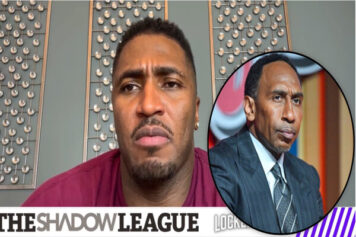When Russell Simmons talks, people tend to listen. And these days the 55-year-old hip-hop impresario has much to say to those who might be his most ardent audience members.
Young black and minority men are being jailed for minor drug offenses at a rate at least six times higher than that of whites nabbed for the same offenses. It’s all made for a suspect system of mass incarceration in which men of color are now as likely to be imprisoned as employed, as likely to have their names printed on prison log sheets as voter ID cards.
To Simmons, who arguably figures as prominently as anyone over the last quarter-century in influencing the way most young people have come to live and define their lives, that’s simply a fact that he just can’t accept.
So Simmons, once saluted by Newsweek as “potentially the most credible and effective leader of the post-civil rights generation,” is teaming with the equally conscientious noted scholar Dr. Boyce Watkins in seeking to change the game.
Their scope, aimed at changing the way minor drug offenders have themselves come to be victimized, is wide and ambitious.
TSL recently spoke with Simmons to find out why this issue is of such concern to him.
TSL: What’s your end game; what exactly are you seeking to accomplish?
RS: We’re trying to rectify a judicial system that remains so unfair a black man is routinely hit with a sentence that can be 10 times greater than that of a white person who’s convicted of the same minor drug offense. It’s that kind of inequality that’s destroying the black family, robbing black households of any kind of male presence. Where I grew up, most of my friends all went to jail for drugs, even though most of them were far from hard core criminals. But, by the time they came home, they were all professionals at it. Nothing good comes from sending someone who’s redeemable off to purgatory.
TSL: You mentioned that men of color are likely to receive much harsher sentences for the same crimes. Why do you think that is?
RS: Plain and simple, the prison system is big business. All over, you’ve got corrupt prison lobbyists doing everything they can to keep building and filling their prison hotels. To them, it doesn’t matter that drug addiction is a disease that should be treated and not something you throw a person into an even deeper hole over. It’s about the business end of it.
TSL: A few years back, you, Jay-Z, Diddy and 50 Cent were all part of a movement that finally led to the repeal of the dreadful Rockefeller Drug Laws. Is it the laws you’re targeting here, also, or more the types of sentences that derive from them?
RS: We’re concentrating on the sentences, more specifically, how they unfairly relate to people of color and the time they’re forced to serve. Our first goal is to make the Fair Sentencing Act retroactive. That way, tens of thousands of young minorities, those who unfairly received these overly harsh sentences to begin with, will have a chance to return to their families, and hopefully, begin to reclaim their lives. You’ve still got people incarcerated under Rockefeller statutes, even though those laws aren’t even still on the books. How do you justify people still being caged over things that are no longer considered criminal?
TSL: Ideally and legally speaking, what would you have society do with small-time, non-violent drug offenders?
RS: Treatment and education. Those resentenced under reform Rockefeller laws have just a nine percent recidivism rate compared to an overall rate of nearly 40 percent. On top of that, 75 percent of these people have never been convicted of any violent felony offense. How fair is it that so many of them are still imprisoned? The racist, false stereotype about all drug offenders also being violent hooligans has been unmasked; it died with the end of the Reagan/Bush era.
TSL: Hearing you speak, there seems to be great urgency in your voice and mission. But truthfully, and as tragic as it sounds, these aren’t exactly new revelations. What makes tackling the issue so much more important in the here-and-now?
RS: Families are hurting now more than ever. More and more, black men are being taken away from the unit, and for longer periods of times than ever before. Even after they’re finally freed and released, their lives are forever changed. They can’t get work, have trouble getting housing and can’t vote. We’re just asking for fairness.
TSL: You and Dr. Watkins have both described the ongoing mass incarceration of black men as the new “Jim Crow,” a system of “commodities being fed into a capitalist machine.” Elaborate.
RS: First of all, at a time when everybody seems concerned about the national debt, the prison system is using its undue influence to solicit billions in tax-payer money for a system that’s proven totally ineffective. Any system that takes young men out of their communities, for the reality of better educating them in criminal behavior, then drops them back into the community at an even bigger disadvantage then where they were at before, definitely fits that description.
TSL: So how can you truly hope to overcome a system that’s clearly so institutionalized?
RS: We will be staging an ongoing social media campaign that also includes writing a letter to the White House, making the administration and Congress aware that we’re demanding a complete overhaul of the racist sentences implemented by this failed “War on Drugs.” We’ve got the support of people from all walks of life, and many of them have provided their signature of support to the letter we’ll soon be making public.
TSL: Who are some of your best known supporters and what role will social media actually be playing?
RS: We’ve got everybody from Jesse Jackson to Diddy to Scarlett Johansson to Ron Howard to Kim Kardashian that have expressed support and will be tweeting posts and information relative to our mission. Some might think having celebs like Diddy and Kim K. involved might take away from the seriousness of what we’re trying to accomplish. You have to know: Diddy and Kim both have millions of Twitter followers. When Diddy tweets, people read, listen and, in this case, we hope become educated and engaged. I can’t think of a quicker way to educate and grow an audience.
TSL: Being one of hip-hop’s foremost pioneers, you understand its reach and power better than most can ever hope to. How do you respond to critics who charge the industry with bearing some blame for the prison culture, thug-life mentality that plagues so many of our youth?
RS: What I know is it’s all cyclical; every 10 years or so, people start blaming hip-hop for all of society’s ills. I don’t see rap as being in a crisis situation; it’s not the cause behind the powers-that-be deciding to imprison all of our young people, and last I checked, it didn’t cause this great recession that has so many people hurting.
TSL: Yeah, but being the Godfather you are, do you feel there needs to be some greater level of accountability from the industry? I mean, in a matter of days Chief Keef was grilled again for inciting violence through his tweets in already gang-ravaged Chicago; Lil Wayne blatantly disrespected the memory of Emmett Till in his lyrics; and cops were moved to launch an investigation concerning the welfare of a nine-year-old boy rapper over some of the overly sexual themes touched upon in his video.
RS: Rappers are going to make poetry no matter what anyone says. They relay to us the stories they see, learn and live through. It’s not always a pretty picture… but it’s their reality. To all those who don’t appreciate the message, I say work to change the conditions that create them and perhaps themes will change. A good place to start would be working on this incarceration project.
TSL: So you’re not of the belief that at least some of the record labels, and perhaps even artists, conspire to take advantage of a climate they’ve somewhat helped perpetuate with little-to-no regard for telling an authentic truth?
RS: I don’t profess to know what everyone’s motivations are. What I do know is that I’ve been a label holder and I know a lot of other people that have been. The overwhelming majority of people involved in hip-hop are because it’s what they love and respect doing. That’s one of the things I’m most proud of about the genre.
TSL: What are some of the others?
RS: You’ve got scholars like Cornell West and Michael Eric Dyson who have written books and taught courses at Ivy League schools about the breadth of hip- hop. We have Barack Obama in the White House, to a large extent, based on the way hip-hop stood up. There might be some things that could be better, but we’re far from the reckless stepchild our critics would have you believe we are.



